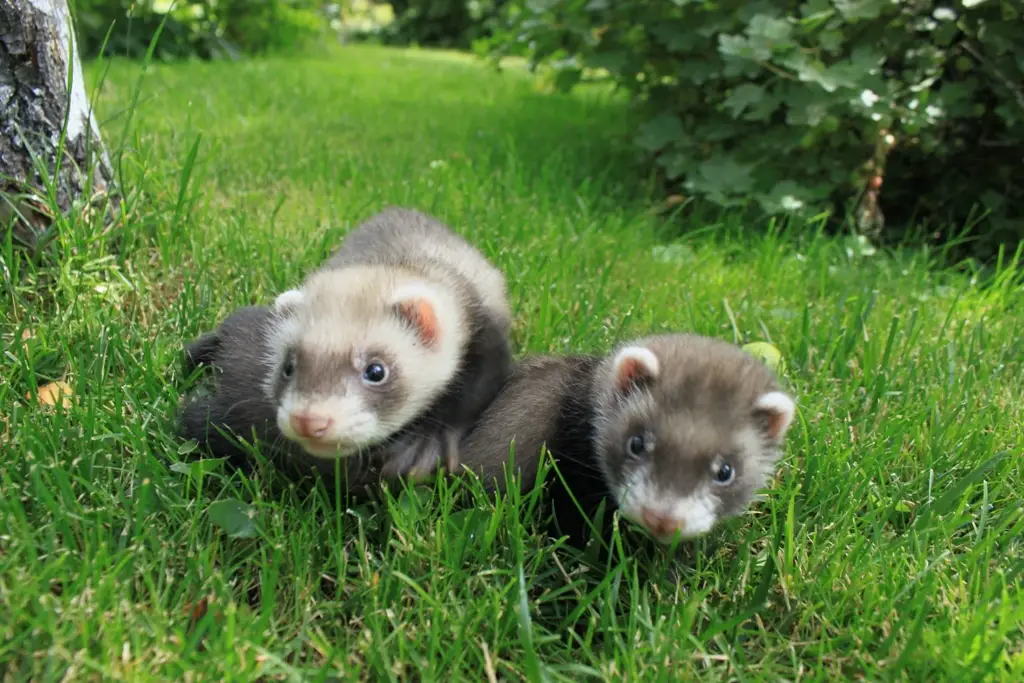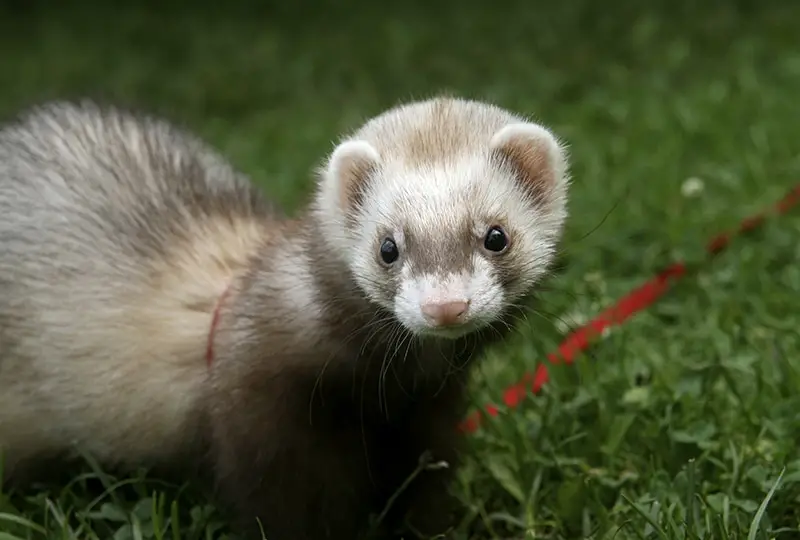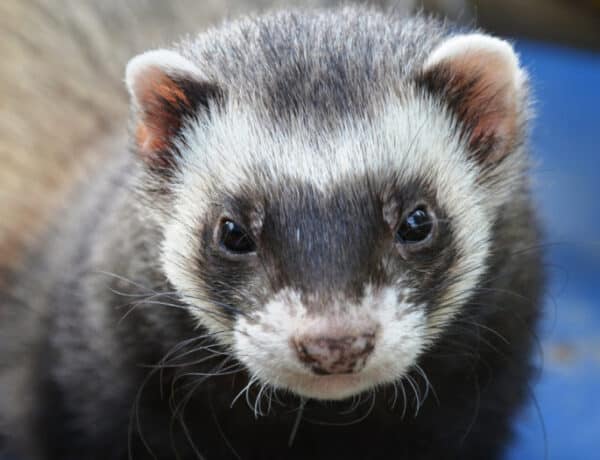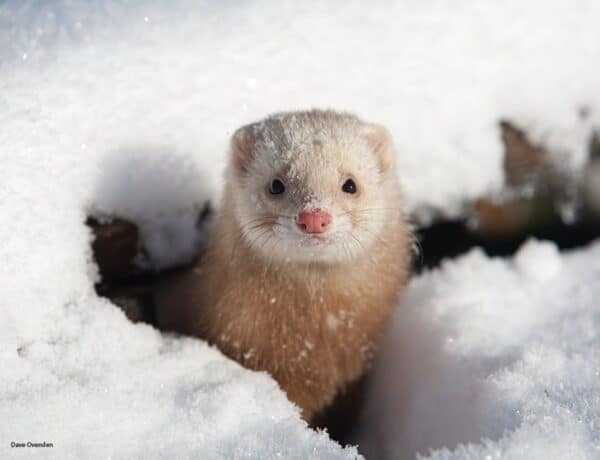Introduction
Do Ferrets Like To Be Held: Ferrets, the curious and playful members of the Mustelidae family, have captured the hearts of many as popular pets. These small, elongated mammals are known for their boundless energy and mischievous personalities, but when it comes to the question of whether they enjoy being held, the answer isn’t as straightforward as it may seem. Understanding a ferret’s preferences for physical interaction is essential for responsible ferret ownership.
Ferrets are naturally sociable animals that thrive on socialization and affection from their human companions. They enjoy playing and exploring, often seeking out their owner’s attention. However, when it comes to being held, ferrets affectionate exhibit a wide range of individual preferences. Just like humans, each ferret has its unique personality and comfort levels when it comes to physical contact.
Some ferrets absolutely love being held and cuddled. They may eagerly climb into your lap or curl up in your arms, relishing the warmth and security of your touch. These ferrets typically display affectionate behaviors, such as nuzzling, licking, and even falling asleep while being held.

Do ferrets like to be cuddled?
Many ferrets like to snuggle with their humans. One thing you can try is getting a hoodie with a front pocket. Your furry little pal may like to curl up in there as you’re relaxing. You can also lie down on the floor with a blanket.
Ferrets, those charming and inquisitive creatures, often leave their owners wondering whether they enjoy the cozy embrace of a cuddle. The answer to this question, much like their playful personalities, varies from ferret to ferret. Understanding their preferences for physical affection is essential for fostering a strong bond with these unique pets.
Ferrets are inherently social animals that thrive on interaction, both with their human caregivers and fellow ferrets. They seek companionship, and many do enjoy cuddling to some extent. However, the degree to which they appreciate it can vary widely.
Some ferrets absolutely adore cuddling. They relish the warmth and security of being held close and will often nuzzle into their owner’s neck or curl up contentedly in their lap. These affectionate ferrets may even emit soft purring-like sounds or display other signs of contentment, such as slow-blinking or relaxed body posture.
On the flip side, some ferrets are more independent and may not be as receptive to cuddling. They might squirm, wriggle, or try to escape if they feel confined or uncomfortable. These ferrets prefer their freedom and may show their affection in other ways, such as playful antics or following their owners around the house.
Do ferrets like to be touched?
Ferrets appreciate a light touch from humans, even though they knock other ferrets around like punching bags. Use as light a touch as you can. The ferret will let you know if they like it. If they really like it, you get licked!
Ferrets, with their playful and curious nature, often leave their owners wondering about their preferences when it comes to physical touch. Establishing a strong bond with these charming pets involves understanding their individual needs and comfort levels with regards to being touched.
Ferrets are naturally social animals that thrive on interaction, and they generally do enjoy being touched to some extent. However, the extent to which they appreciate physical contact can vary widely from one ferret to another.
Many ferrets relish being touched and petted. They may lean into your hand, close their eyes in contentment, or even emit soft purring-like sounds to show their pleasure. These ferrets often seek out their owner’s touch, and stroking their fur can be a great way to bond and build trust.
On the other hand, some ferrets are more reserved and may be less receptive to touch. They might squirm or wriggle away if they’re not in the mood for petting. These ferrets tend to prefer more independent interactions or might be more interested in play and exploration.
To determine whether your ferret enjoys being touched, it’s crucial to pay attention to their cues. Observe their body language and reactions. If they seem relaxed, lean into your hand, and appear to be enjoying the attention, then they likely appreciate being touched. However, if they show signs of discomfort, like trying to escape or nipping, it’s best to respect their boundaries and give them some space.
Do ferrets like to play with humans?
He also points out that ferrets really enjoy playing with their humans: “A ferret that jumps back and forth in front of you and nips at your feet is telling you it wants to play.
Ferrets, known for their boundless energy and playful antics, are social animals that often seek interaction and stimulation. This makes playing with humans an enjoyable and essential aspect of their lives. However, the extent to which ferrets like to play with humans can vary based on individual temperament and experiences.
In general, ferrets are highly social creatures that thrive on companionship, whether it’s with other ferrets or their human caregivers. They often enjoy playing with humans and see it as an opportunity for bonding and fun. Some common ways ferrets like to play with humans include:
Chase and Hide-and-Seek: Ferrets love to dart around and hide in various places. Playing games like chase or hide-and-seek with your ferret can be immensely entertaining for both you and your furry friend.
Tug of War: Ferrets have a natural instinct to grab and pull objects. Providing them with appropriate toys for a game of tug of war can be a fantastic way to engage their playful spirit.
Interactive Toys: Ferrets are drawn to toys that move, make noise, or mimic prey. Toys like feather wands or balls that roll around can captivate their attention and keep them engaged.
Wrestling and Roughhousing: Ferrets have a rough-and-tumble play style. They often enjoy wrestling with their human companions, as long as it’s done gently to avoid injury.
Tunnel Play: Ferrets adore crawling through tunnels or pipes. Creating a maze or providing them with tunnels to explore can be a source of endless amusement.
Do ferrets hurt when they bite?
It’s worth noting that the ferret’s skin is thicker and tougher than human skin, so when ferrets nip at each other in play, they don’t inflict any real pain. But when they nip at a human, it can hurt.
Ferrets, with their sharp teeth and inquisitive nature, have the potential to deliver painful bites if they feel threatened or agitated. However, it’s essential to understand that ferrets usually do not bite with the intent to hurt or harm humans. Instead, they may resort to biting as a form of communication or self-defense.
Here are some factors to consider regarding ferret bites:
Communication
Ferrets have a unique way of communicating, and sometimes they use their mouths to do so. They may nibble or gently bite to get your attention or express their excitement. These bites are usually not painful but rather a form of interaction.
Playfulness
Ferrets have a playful nature, and during playtime, they may engage in mock bites. These are typically gentle and intended for fun rather than causing harm.
Fear or Aggression
Ferrets may bite if they feel threatened, scared, or cornered. In such cases, their bites can be more painful, and they may clamp down. This is their way of defending themselves when they perceive a threat.
To minimize the chances of painful bites from ferrets, it’s essential to follow these guidelines:
Socialization
Properly socialized ferrets are less likely to resort to biting. Spend time with your ferret, handle them gently, and provide positive interactions from a young age to build trust.
Read Body Language
Pay close attention to your ferret’s body language. If they arch their back, hiss, or display other signs of discomfort, it’s best to give them space and avoid handling them at that moment.
Training
Use positive reinforcement techniques to train your ferret not to bite. Reward good behavior with treats and provide redirection when they exhibit undesirable biting tendencies.
Avoid Rough Play
While roughhousing can be a form of play for ferrets, be mindful not to encourage behavior that might lead to painful bites. Use soft toys and gentle interaction during playtime.
Seek Veterinary Advice
If your ferret suddenly starts biting more aggressively or frequently, it could be a sign of an underlying health issue. Consult with a veterinarian to rule out any medical problems.
What are ferrets scared of?
Ferrets are fearless.
Ferrets, to their benefit or detriment, are not afraid of anything! This makes them great friends for cats, dogs, and other ferrets. It also makes them dangerously curious – so be sure you ferret-proof your home before playtime!
Ferrets, with their playful and curious nature, are generally fearless creatures. However, like all animals, they can have certain fears or aversions. Understanding what ferrets might be scared of can help you create a safe and comfortable environment for your furry friends.
Loud Noises
Ferrets have sensitive hearing, so sudden loud noises like thunderstorms, fireworks, or even vacuum cleaners can startle them. They may become anxious or seek refuge in a safe place during such events.
Strangers
Ferrets are typically social animals, but they can be wary of unfamiliar people or animals. Introduce new individuals slowly and in a controlled manner to prevent fear-based reactions.
Sudden Movements
Quick and unexpected movements, especially if they come from above, can startle ferrets. Avoid making sudden motions around them to prevent unnecessary fear.
Being Restrained
While ferrets enjoy being handled by their trusted owners, they may become frightened if restrained too tightly or in a way that restricts their movement. It’s important to handle them gently and respectfully.
Unfamiliar Environments
Ferrets are creatures of habit, and sudden changes or unfamiliar surroundings can be intimidating to them. If you take your ferret to a new place, be patient and allow them time to acclimate.
Harsh Discipline
Yelling or physical punishment can scare ferrets and damage the trust between you and your pet. Positive reinforcement and gentle correction are more effective and kinder ways to train and manage behavior.
Confinement
Being locked in a small, dark, or tight space can be frightening for ferrets. Ensure they have a comfortable and spacious living environment with plenty of opportunities for exploration and play.
Unfamiliar Scents
Ferrets have a keen sense of smell, and strong, unfamiliar scents can be unsettling. Avoid using strongly scented cleaning products or perfumes around them.
Predatory Animals
Ferrets have a natural prey instinct, so the presence of larger predatory animals, such as dogs or cats, may cause fear. Supervise introductions between your ferret and other pets carefully.
Medical Procedures
Going to the vet and undergoing medical procedures like shots or examinations can be scary for ferrets. Minimize their stress by using a comfortable carrier and providing treats and comforting words during and after the visit.
Do ferret teeth fall out?
At 7-9 weeks of age, the ferrets will start losing their milk teeth which permanent ones will replace. The permanent teeth replacement will complete in 9 months, giving the ferret a new dental formula.
Ferrets, like many mammals, go through various dental changes throughout their lives, but their teeth do not typically fall out in the same way that human baby teeth do. Instead, ferrets have two sets of teeth that serve different purposes.
Baby Teeth (Deciduous Teeth): Just like humans, ferrets are born with baby teeth, also known as deciduous teeth. These baby teeth begin to emerge at around three weeks of age and help young ferrets nurse from their mother. They have a softer texture than adult teeth and are eventually replaced by permanent teeth.
Adult Teeth (Permanent Teeth): As ferrets grow, their baby teeth gradually fall out, and their adult teeth replace them. This process usually occurs between the ages of three and four months. Adult ferrets have a total of 34 teeth, including canines, incisors, and premolars, which are well-suited for their carnivorous diet and hunting instincts.
Unlike rodents, such as rats or mice, ferrets do not continuously grow their teeth. Instead, they have a set number of teeth that are maintained through regular chewing and grinding, which helps keep their teeth healthy.
Do ferrets sleep all night?
Ferrets sleep around 18 hours a day, and very deeply. They tend to acclimate their sleeping pattern to their owners’, so your ferret may actually sleep through the night and be more awake in the day, just like you!
Ferrets are known for their energetic and playful behavior, but they also have a strong nocturnal instinct, which can affect their sleep patterns. Understanding ferret sleep habits can help you provide the best care for these unique pets.
Ferrets are crepuscular animals, which means they are most active during the dawn and dusk hours. In the wild, this behavior allows them to hunt and explore when it’s cooler and safer from predators. This natural tendency toward crepuscular activity can sometimes lead to the misconception that ferrets are strictly nocturnal.
Ferrets do sleep a lot, but their sleep is not continuous throughout the night. Instead, they tend to have multiple short sleep cycles, which last approximately 4-6 hours each. These sleep cycles are interspersed with periods of activity and play, which can occur during the evening and early morning.
During their waking hours, ferrets are highly active and require mental and physical stimulation. They love to explore, play with toys, and engage in interactive activities with their owners. If you’re a ferret owner, you’ll likely notice these bursts of energy in the evenings and mornings.

Conclusion
Ferrets are naturally sociable animals that thrive on socialization and affection, both with their human caregivers and fellow ferrets. However, their comfort with being held varies from one ferret to another.
Some ferrets care absolutely love being held and cuddled. They relish the warmth and security of human touch, often seeking out their owner’s attention and displaying affectionate behaviors such as nuzzling and purring. These ferrets typically enjoy the closeness and bonding that holding provides.
On the other hand, some ferrets are more independent and may not appreciate prolonged periods of being held. They may squirm, wriggle, or even nip if they feel confined or uncomfortable. For these ferrets, interaction through play and exploration may be their preferred form of bonding with humans.
The key to fostering a positive relationship with your ferret lies in understanding their cues and respecting their boundaries. Pay attention to their body language, vocalizations, and overall demeanor. If a ferret seems content and relaxed in your arms, continue holding them gently. However, if they display signs of discomfort or agitation, it’s crucial to release them and engage in other forms of interaction they find enjoyable.





No Comments